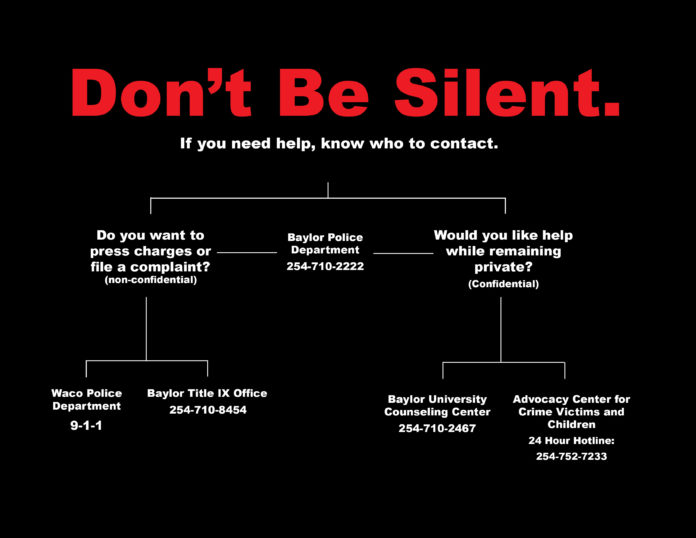By Phoebe Suy | Staff Writer
Baylor’s Title IX office offers a number of resources for survivors of sexual assault or harassment. However, in the instance that an individual is seeking off-campus support, the Waco Police Department and the Advocacy Center for Crime Victims and Children are two resources in the Waco community that survivors can reach out to.
Sgt. Patrick Swanton of the Waco Police Department said the first thing the police department always encourages is for victims of any criminal offense to contact the police immediately and make a report.
Specifically for sexual assault victims, Swanton recommends calling 911 first if they are hurt or injured. Even if they are not physically hurt, Swanton still encourages them to call 911 and inform them they need an officer.
“If you don’t feel comfortable saying you’ve been a victim of sexual assault, then just tell them it’s a very personal offense and that you want an officer to come talk to you in reference to it,” Swanton said. “We’ll send officers out immediately.”
Swanton also asks victims of sexual assault not to disturb any physical evidence that could potentially be used in an investigation. Items such as bed sheets, wash rags, towels or clothing should not be washed. Even a drinking glass, a cigarette or a piece of gum could be collected as evidence.
“The important thing to know is victims of sexual assault do not have to be willing to file charges,” Swanton said. “But it is important for them to go ahead and contact us … even if the victim doesn’t want to file charges. There are a lot of personal reasons why they don’t; we understand that. We would encourage victims to file the criminal charges because we’d like to see those offenders in jail. However, we understand that is a very personal decision and one only a victim of sexual assault can make.”
Swanton said medical care for survivors is the first priority. After medical needs are taken care of, then they can begin the investigation.
Swanton said Waco Police Department officers are trained to be sensitive and understanding to the difficulties a survivor of sexual assault may be facing.
“Our officers are trained in the academy very early on how to investigate sexual assaults,” Swanton said. “We put the officer in the position of, what if this was you, what if this was your sister, or your mom, your brother that got sexually assaulted? How would you want the officers to treat them?”
The Waco Police Department has a victims’ services unit made up of civilian volunteers who are prepared for anything from offering a shoulder to cry on to helping clean a home after police have investigated.
“For us on these kind of offense reports, it’s not just a business, the facts, kind of thing,” Swanton said. “We are very sensitive to [victims’] needs first. Obviously we want to do the best we can for criminal investigations, but we strongly encourage victims of these kinds of offenses; yes, this is going to be uncomfortable to have to relive and tell somebody else, but we want to help.”
Similar to the Waco Police Department’s victims’ services, The Advocacy Center in Waco offers a variety of resources to crime victims. In addition to 12 free counseling sessions, the center provides advocates for survivors, among other resources.
McKinney senior Katie Mendez volunteers at the Advocacy Center’s hotline. If a survivor of sexual assault calls the center’s 24-hour crisis hotline, they would get connected with a trained advocate and volunteer such as Mendez.
Advocacy Center hotline volunteers are trained in a 40-hour week where they learn from a variety of organizations in the community such as Child Protection Services (CPS), UnBound, Family Abuse Center and police officers. The training provides an opportunity to see a number of perspectives on assault. The training ends with a visit to the hospital to understand the rape kit process and learn how to effectively navigate the facilities.
“My role as a hotline person is to make sure [the victim is] getting every service that she could possibly need,” Mendez said. “If somebody reports an assault, they immediately call the advocate to go and advocate for the person.”
Advocates such as Mendez meet survivors of sexual assault at the hospital and remain with them for the duration of their time at the hospital. Mendez says if the police officers and nurses are being difficult, the advocacy center is there to serve as a buffer.
“As an advocate, if I see a police officer being rude to the victim, my job is to snap at him and tell him to stop,” Mendez said.
In her experience as an advocate, Mendez said there have been times when police officers or nurses were rude to the survivor. For example, she said sometimes nurses would take longer than necessary to get medication, leaving the survivor to just sit and wait, resulting in lost time.
Both the police department and the advocacy center refer sexual assault survivors to the hospital, but Mendez acknowledged it can be expensive. While the rape kits are free when survivors sign the consent form, they still get charged for being in the hospital.
Mendez said there is victim’s compensation that victims can apply for, but they must cooperate with the police in order to be eligible to apply.
Although reporting sexual assault can be difficult for a number of reasons, Mendez said she believes most people regret not reporting.
“If you do report, there’s a chance they might be great, there’s a chance they might be bad,” Mendez said. “If you don’t report, you don’t get one or the other. So you just won’t get help, period.”






